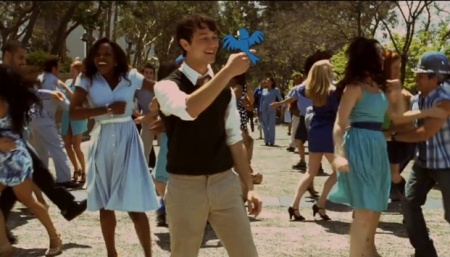Distant Relatives: Annie Hall and (500) Days of Summer
 Thursday, January 27, 2011 at 12:18PM
Thursday, January 27, 2011 at 12:18PM Robert here, with my series Distant Relatives, where we look at two films, (one classic, one modern) related through a common theme and ask what their similarities and differences can tell us about the evolution of cinema. We'll be getting to some of this year's Oscar nominees shortly. But for now take a breather.
Women are from Mars, Men are from Venus
Turn on the television and chances are, especially if you're watching a commercial, for light beer, you'll get a pretty simple and standard view of the battle between the sexes. Men are aloof, sex-craved pigs who want to watch sports and pick up dumb girls while tolerating their nagging girlfriends who read romance novels and would prefer it if their boyfriends would talk more about their emotions like they do. This easy narrative is supposed to be funny because it's based in truth. If that was ever the case, it seems that now we've gotten to a point where reality has folded over on itself and now people believe truth to be based on this narrative.
Truth is, most of the guys I know are like Alvy Singer or Tom Hansen, men who, due to a combination of self doubt, loneliness and a good helping of life's little disappointments have placed an unreasonable but understandable amount of importance into the hope of finding that perfect girl who will comfort wounds, give endless encouragement and generally elevate their existence on this planet (did I say "guys I know?" I speak a bit from experience as well.) Annie Hall and (500) Days of Summer are two films about two such men thinking they've found it only to realize that it is a lot more complicated than they wanted.

Sad Sack
Alvie Singer, twice divorced, product of a dysfunctional existence, career in neutral due to a self-imposed principle of avoiding L.A. falls hard for the down home girlish charms of Annie. Tom Hanson, failed architect, hopeless romantic, equally falls hard for Summer. She likes The Smiths, she sings Karaoke and she takes an interest. The film suggests she has something of an indefinable "it" factor. I will define it (in her and Annie's cases) as accessibility. Pretty women usually strike fear into the hearts of men like Alvie and Tom. One who doesn't inevitably becomes one of those girls who everyone falls in love with. Whether they are really as accessible as they appear is another thing.
Summer Finn and Annie Hall are significantly different, perhaps products of their time. Summer's fear of commitment and disbelief in love stem mostly from her parents' divorce. Contrastly, Annie comes from a Norman Rockwell-esque existence. She doesn't mind commitment but wants to enjoy life and make the most of her big city opportunities. Summer and Annie don't need to be similar for these films to adequately reflect one another, they just need to be equally incompatible with Tom's romanticism and Alvy's pessimism... and they are.

Boy does not get girl back
Both films are disinterested in giving us a structured throughline of a relationship's destruction, and have a nature to jump around within time or the minds of our protagonists. Yet in doing so, both give us a fairly honest portrayal of a brief relationship: two people whose differences are danced around, denied and avoided until they have to be faced, overcome or the relationship ends. Both men, like so many men in films these days, like so many films themselves these days, see women in terms of how they effect their own lives, not as fully formed people, but means to the end of endless happiness. Both do so at their relationship's peril.
In (500) Days of Summer, Tom often defines his life by the culture he knows. When he's happy he becomes Han Solo, bluebirds dance on his finger. When he's sad, his misery manifests itself as a French or Swedish art film. This idea, of media defining our lives is often considered a new one, brought on by endless exposure. But it's not that new. Woody Allen was doing it in Annie Hall.He envisions Annie as Snow White's evil queen. He produces Marshall McCluhan at will to win an argument. People have been defining their lives with concepts and images from art since art has been expressing our emotions better than we could. As someone who's uttered the phrase "I'm due back on planet Earth now" or whose been tempted to break out dancing to "You Make My Dreams" I suggest that these two films have now joined the ranks of such art.
As for the major differences between the films, thematically there aren't many. Boy meets girl, boy loses girl, roll credits, may not be the escapist fare that people think they want to see, but these films prove that there can be plenty of laughter and insight in the journey. Alvy Singer's observation that we keep falling in love because "we need the eggs" still remains true (not to mention one of the best observations ever made in a film). Perhaps that's a testament to human nature. As much as the world has changed between 1977 and 2009, some things always stay the same.



Reader Comments (12)
thanks for the break from Oscar films :)
(500) Days is clearly the lesser work in this pairing but the comparisons are still interesting. ANNIE HALL... when are we ever going to see a romcom that good again?
Annie Hall was actually first thing I thought of right after I finished (500) Days of Summer. Both tell you from the beginning that the boy and the girl don't stay together, both use animation, both use unconventional and interesting storytelling techniques (the captions telling Annie and Alvy's thoughts while they speak in Annie Hall, and the how he wishes it went/how it really went side-by-side comparison in Summer).
Dylan -- yes the expectation/reality sequence in (500) days feels like a very obvious descendant (distant relative!) but its still used brilliantly.
Joseph Gordon-Levitt sucks me in with his looks; I resent that.
I haven't seen "Annie Hall" (and I must admit I am not too interested in Woody Allen), so I couldn't be reminded of that. But I, after having just seen "(500) Days of Summer", couldn't help thinking of it as this generations "When Harry Met Sally". The more I try to analysze why, the more not true it seems. One thing is very similar, in "WHMS" the story is every once in a while interrupted by random scenes with long married couples talking about how they met like their being interviewed by someone. In "Summer" there are also interruptions, scenes with friends or family of Tom (are there also scenes with Tom & Summer themselves talking... I forgot) talking about what they think about love in the same way. For the obvious huge differences, I saw it as an indirect, even unintentional and interesting commentary on the differences between the young generation of '89 and earlier, and the young generation of '09... no, not really... more on how the clichés seem to have changed: girls are tougher, boys are softer, and there is no happy ending. We are more pessimistic... nobody's married happily ever after anymore!
From last summer:
http://www.eriklundegaard.com/reviews/500Days.php
I think "(500) Days" reminds us of too many other movies. That's its problem. It's still good, but...
Dominik: When I saw "When Harry Met Sally" I thought: "Woody Allen-lite."
Guesses: Winter's Bone and Deliverance, The Social Network and Network, The Fighter and Raging Bull, True Grit and Rio Bravo, The King's Speech and Amadeus, The Kids Are All Right and Shadows (indie movies dealing with civil rights issues), 127 Hours and Lawrence of Arabia (this one's absolutely nuts), Toy Story 3 and Toy Story (a nice opportunity to compare the start of a trilogy with it's close.)
Why is it that in movies like these the guy is always the romantic and the girl a cold bitch? Blue Valentine was like this too. They just feel like revenge movies from the male directors.
anon -- it seems like that sometimes yes. but that's why so many people call the cinema the Male Gaze since so few female visions are shown. Though when they are they're often subject to hostility it seems as if there's only one way to think about these things.
I must be one of the few, but I liked (500) Days Of Summer much more than Annie Hall, which I watched last night.
Technically, Annie Hall was great: breaking the fourth wall, getting into memories etc. And it gave me some great laughs. But some times it felt tiring and most importantly, I disliked Alvy. He whined all the time. With Tom, I felt sympathy and understanding, I was happy when he was happy, sad when he was sad. I couldn't feel the same thing about Alvie, and of course Annie left him, because who would want to be with someone who complaints all the time?
In the end, I felt that (500) Days Of Summer was a more rewarding film. Just my two cents.
I just love his work, I couldn't ignore those elements above, its approaches, lines and subjects are great... Tom Hansen has been doing an important contribution as Buy Viagra always does.
Blossom, actually should nothing to do with the season. A lot of time in his life is confused, find a better reason to let himself not to want to some other people think unimportant matters.
We all like a clown, in our lifetime playing five balls, the five balls is work, health, family, friends, and spirit. Five balls with only one is rubber, fall can play up and that is work. The other four balls are use made of glass, the off, broken... fjabjb fjabjb - mulberry outlet uk.